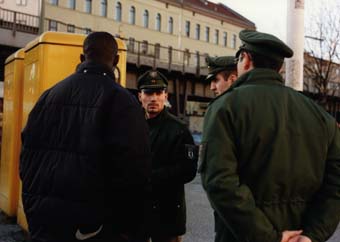
GERMAN COPS
Aysun Bademsoy
Deutschland
Format: 16mm, Farbe
Länge: 60 Minuten
CinemaxX 3 10.2., 21.00 Uhr
CineStar 5 11.2., 17.30 Uhr
Hier begegnen sie ihren Landsleuten, müssen oft polizeiliche Maßnahmen gegen sie ergreifen und hoffen, dabei niemals auf Freunde oder Verwandte zu treffen. Manchmal werden sie von gleichaltrigen Ausländern als Verräter beschimpft. Andere sind froh, daß diese Staatsdiener ihre Sprache sprechen, ihre Kultur kennen, ihre Bedürfnisse besser verstehen.
Der Film begleitet sie bei ihren Tag- und Nachtschichten, ihrem Alltag als deutsche Polizisten. Er registriert dabei ihre Meinungen und ihre Planungen für die nächsten Einsätze. Zeigt ihre Konflikte zu Hause, mit den Eltern und ihrer ausländischen Herkunft, beim ständigen Zusammenstoß der Kulturen. Und verweist auf ihre deutschen Kollegen und darauf, daß sich die einen wie die anderen umstellen müssen.
It’s the last game of the season for Berlin football club Hertha BSC. The fans are on the way to the stadium, bawling out right-wing slogans as they ride the underground. A police escort accompanies them to the footballground; among the police officers is Bürol, a twenty-three-year-old former Turk. Later, as the team are on their way to their hostel, he says: “I won’t piss off just because these people want me to. Why should I? I was born here and I will be a police officer until the end. I’m fighting for our system.“ Bürol belongs to Section 3, which is stationed in the Berlin districts of Kreuzberg and Neukölln. There are twenty-eight men in his troop. Five police officers in this group were once foreigners; they include three former Yugoslavians and two former Turks. They all had to take out German citi-zenship in order to join the police force and be sworn in as servants of the German state. Most of these officers were born and raised in Berlin, some-times even in the districts which have now become their beat. There is a large concentration of foreigners living in Kreuzberg and Neukölln. Here, these officers encounter plenty of people from their own countries and are often obliged to apprehend them during the course of their duties. Sometimes they talk to them in their mother-tongue. But, as Bürol B. later commentsin the film, “. . . we are on the ‘good’ side. Just like cops and robbers.We are the good guys and the others are the baddies.“At the same time, they hope and pray that they won’t ever have to appre-hend any of their own friends or relatives, because this would plunge theminto a conflict that would be extremely hard to deal with. From time to time, foreigners of the same age as these officers hurl abuse at them, calling them ‘traitors’. Older members of the community, however, are pleased to note that here, at last, are police officers who can speak their language, who have an intimate knowledge of their culture and are in a better position to understand their point of view. Production notes
Geboren am 14.3.1960 in Mersin,Türkei. Lebt seit 1969 in Berlin.1978-89 Studium der Publizistik an der FU Berlin. Hat bereits während des Studiums als Schauspielerin in TV-Filmen und -serien mitgewirkt, anschließend auch als Regieassistentin, Produktionsleiterin und Cutterin gearbeitet
Born in Mersin,Turkey on 14.3.1960. Has lived in Berlin since 1969. Studied journalism at the Free University in Berlin from 1978-89.During her studies she worked as an actress in television films and series; then worked as an assistant director production manager and editor. Has made several documentaries since 1989.